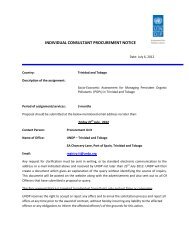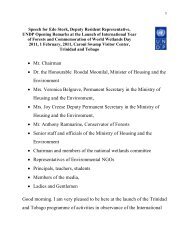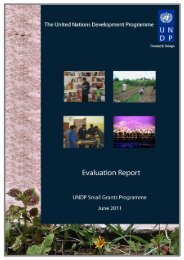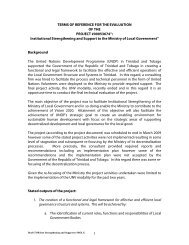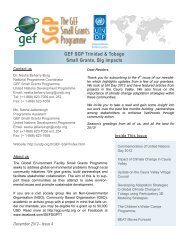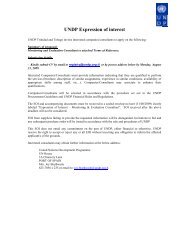The View from the Boardroom - UNDP Trinidad and Tobago
The View from the Boardroom - UNDP Trinidad and Tobago
The View from the Boardroom - UNDP Trinidad and Tobago
Create successful ePaper yourself
Turn your PDF publications into a flip-book with our unique Google optimized e-Paper software.
<strong>The</strong> <strong>View</strong> <strong>from</strong> <strong>the</strong> <strong>Boardroom</strong> - CEO Study on Corporate Social Responsibility in <strong>Trinidad</strong> <strong>and</strong> <strong>Tobago</strong>CHAPTER 4Managing Human Capital through CSR – <strong>The</strong> Business Case for Corporate VolunteeringManaging Human Capital throughCSR – <strong>The</strong> Business Case forCorporate VolunteeringCHAPTER 4<strong>The</strong> field of corporate volunteering <strong>and</strong> employee engagement has gainedincreasing popularity among CSR managers <strong>and</strong> sustainability advocates inrecent years. Many corporations in larger markets are placing more <strong>and</strong> moreemphasis on <strong>the</strong> mobilization of <strong>the</strong>ir employees for social outreach activities<strong>and</strong> environmental conservation programmes <strong>and</strong> some multinational companieslike IBM or pharmaceutical giant Novartis have even gone as far as undertakingproject-type development work on a global scale sending <strong>the</strong>ir staff into remotecorners of <strong>the</strong> world to utilise <strong>the</strong>ir skills outside <strong>the</strong> domestic corporateframework. 32 CEOs in leading manufacturing hubs <strong>and</strong> large consumer marketshave increasingly begun to see employees as <strong>the</strong>ir companies’ personified socialconscience <strong>and</strong> it is through corporate volunteers that <strong>the</strong> business communitycontinues to explore new <strong>and</strong> more pro-active forms of corporate social outreachdifferent <strong>from</strong> conventional forms of private sector contributions to society suchas charitable giving.<strong>The</strong> idea of corporate citizenship haswidened its appeal in many parts of<strong>the</strong> global marketplace <strong>and</strong> manycompany leaders have begun to realisethat <strong>the</strong> mobilization of staff forvolunteer projects could sustainablyaddress social needs while paying acommercial dividend in <strong>the</strong> mediumtolong-term. In <strong>the</strong> words of CSRscholar Kenn Allen: “Businesses getcredit for what <strong>the</strong>y are contributingto <strong>the</strong> community <strong>and</strong> for <strong>the</strong>opportunities for fulfilment <strong>and</strong>personal development <strong>the</strong>y areoffering <strong>the</strong>ir workers while <strong>the</strong>re isalso acceptance that businesses canfairly expect a ‘return on investment’<strong>from</strong> this commitment. 33In this win-win situation, <strong>the</strong> benefits ofcorporate volunteerism to communitylife are considerable <strong>and</strong> it has longbeen recognised that employeevolunteers have <strong>the</strong> potential to makea significant contribution towardssocial development on communitylevel <strong>and</strong> <strong>the</strong>refore to <strong>the</strong> achievementof national development objectives.<strong>The</strong> principles <strong>and</strong> guidelinesenshrined in <strong>the</strong> 2002 World Summiton Sustainable Development <strong>and</strong>in <strong>the</strong> Millennium DevelopmentGoals (MDGs) campaign have beenproviding universal frameworksfor corporate responsibility <strong>and</strong>, inparticular, <strong>the</strong> activities of corporatevolunteers. Little disagreement existswith respect to <strong>the</strong> business benefitsof corporate volunteering. <strong>The</strong> mosttangible gains are usually being madewithin <strong>the</strong> company thus formingpart of what is commonly referred toas ‘Internal CSR’. Benefits range <strong>from</strong>increased level of individual motivationof staff to higher rates of retention, agreater degree of innovative practices,streng<strong>the</strong>ned corporate reputation<strong>and</strong> improved customer relations.In <strong>the</strong> words of A. Norman Sabga,Chairman <strong>and</strong> CEO of <strong>the</strong> AnsaMcAl Group of Companies: “If one ofour organisations, for instance Abeladopted an orphanage in Chaguanas,32 See ‘Big-Hearted Blue’, <strong>The</strong> Economist, 28th October 2010.33 Kenn Allen, ‘<strong>The</strong> social case for corporate volunteering’, Australian Journal on Volunteering, Vol.8, No.1, 2003, p.58.57




